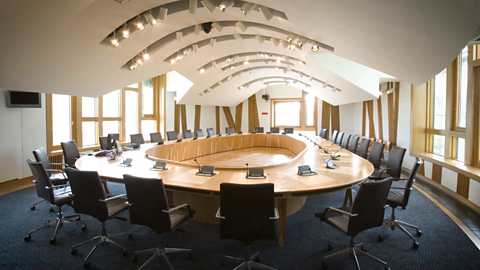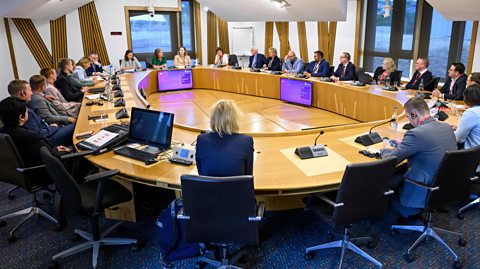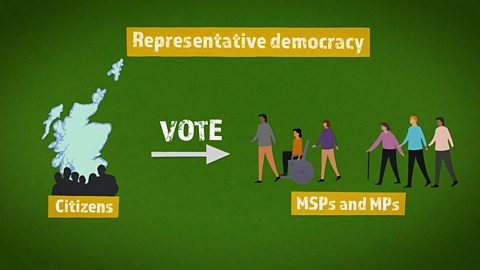What are Scottish Parliament committees?
Quick version
Committees are groups of MSP that look into specific topics or issues.
Their job is to:
- identify and respond to issues
- gather and evaluate evidence
- examine the work of the Scottish Government
- contribute to legislation by introducing, examining and amending bills
They can do this by:
- holding an inquiry
- looking at legislation
- scrutinising the work of the Scottish Government
- producing reports and recommendation
A committee is made up of convener (who chairs and leads), deputy convener and committee members.
Committee membership is based on the share of seats that each party has in the Parliament.
Learn in more depth
What is the purpose of Scottish Parliament committees?
The Scottish Parliament does not have a second chamber like the House of Lords. Instead, it has a powerful committee system which can propose as well as scrutinise bills.
Committees are made up of small groups of MSP from different parties. Each committee has a remit to look at a specific area. The committee can decide to look into any aspect of this remit.

Committees have a number of purposes:
- to identify and respond to issues
- to gather and evaluate evidence and information
- to examine the work of the Scottish Government and hold it to account
- to contribute to legislation:
- by introducing their own bills
- by examining bills
- by recommending amendments to bills

What types of committee are there?
 Image source, IAN GEORGESON / Alamy
Image source, IAN GEORGESON / AlamySome committee are mandatory committees which must always exist, for example:
the Scottish Parliament's Citizen Participation and Public Petitions Committee considers any issues raised by members of the public brought to the Scottish Parliament in the form of a petition, providing they meet certain criterion
the Public Audit Committee looks at reports published by the Auditor General for Scotland to ensure that public money is spent efficiently and effectively by the Scottish Government and other public bodies, such as the NHS in Scotland
Some committees are subject committees which look at specific issues or topics, for example:
- health, social care and sport
- education, children and young people
 Image source, IAN GEORGESON / Alamy
Image source, IAN GEORGESON / AlamyHow do Scottish Parliament committees function?
Committees can look at issues related to their remit in a number of ways:
- holding an inquiry
- looking at legislation
- looking at the work of the Scottish Government
What are inquiries?
An inquiry is when a committee looks into a particular issue or topic as part of their remit:
- the committee examines the issue
- it issues a call for views - this allows the public to have their say about the issue, usually through an online submission
- it gathers evidence and different views from individuals, experts and representatives of organisations during evidence sessions
- it can visit different organisations or locations to find out more about the issue
How do committees consider legislation?
Committees look into bills (proposed laws or changes to laws) and secondary legislation that supports a bill:
- the committee hears views and evidence of what the impact of the legislation would be
- it considers the evidence and produces a report with recommendations
- it recommends whether Parliament should agree or disagree with the general principles of the bill
- if the bill is passed after a debate and vote, the committee looks into any proposed amendments
- the committee votes on which amendments to include
How do committees hold the Scottish Government to account?
Committees look at the work, plans and spending of the Scottish Government that relate to their remit:
- they can ask the First Minister ministers and civil servants to appear before the committee to answer questions
- they can hold debates in the chamber
- they can produce reports with recommendations to the government
- the government does not have to accept recommendations
- but it must respond to them
When and where do committees meet?
- committees usually meet every week or every two weeks.
- meetings take place on a Tuesday, Wednesday or Thursday morning.
- meetings are normally held in a committee room at the Scottish Parliament
Sometimes committees will travel to other parts of Scotland to visit specific locations or to meet with people from different places.
What is the composition of Scottish Parliamentary committees?
Committees are made up of between three and fifteen MSPs.
There are three different roles in a committee:
- convener - leads the committee, runs meetings, represents and speaks for the committee
- depute convener - stands in for the convener when they are unavailable
- committee members - contribute to planning the committee's work, ask questions in meetings or inquiries, contribute to reports and agree on contents
Who decides on committee membership?
The number of committee members each political party has is based on the share of seats that party has in the Parliament.
Political parties choose which of their MSPs they would like to represent them on a committee. Membership has to be agreed by the Parliament.
The Parliament also agrees which political party the convener and deputy convener should come from.At its first meeting, the committee itself votes to decide which MSPs should take on these roles.
Quiz
Recap what you have learned
Committees are groups of between three and fifteen MSPs that look into specific topics or issues - their remit.
The purpose of a committee is to:
- identify and respond to issues
- gather and evaluate evidence
- examine the work of the Scottish Government
- contribute to legislation by introducing, examining and amending bills
Committees function by:
- holding an inquiry
- looking at legislation
- scrutinising the work of the Scottish Government
- producing reports and recommendation
Committee membership is based on the share of seats that each party has in the Parliament:
- each party proposes which of their MSPs should represent them on the committee
- Parliament must agree on membership
- Parliament agrees which party the convener (who chairs and leads) and depute convener should represent
- the committee has final vote on who takes on these roles.
More on Democracy in Scotland
Find out more by working through a topic
- count18 of 18
